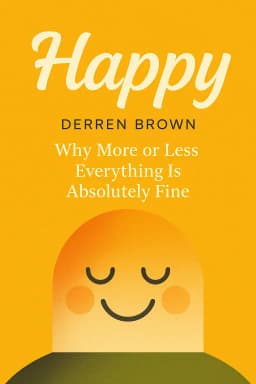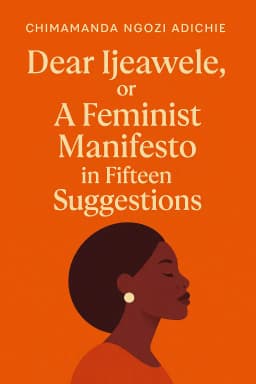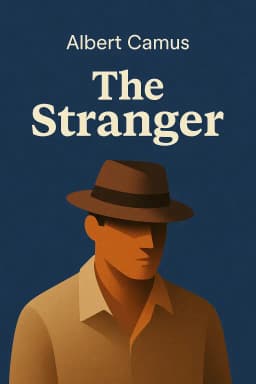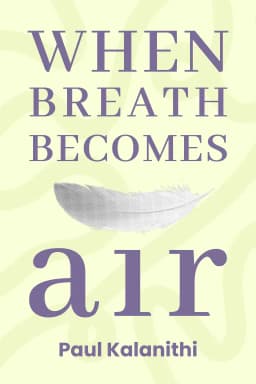
The Happiness Paradox
Why more or less everything is absolutely fine
Golden Hook & Introduction
SECTION
Michael: The self-help industry is a multi-billion dollar giant built on one promise: 'Think positive, get rich, be happy.' But what if that's not just wrong, but dangerously so? What if the real secret to happiness is to stop trying so hard? Kevin: That feels like a trap. If I stop trying to be happy, won't I just be... miserable? It sounds like a paradox. But I'm listening. Michael: It's the exact paradox at the heart of today's book, Happy: Why More or Less Everything Is Absolutely Fine by Derren Brown. Kevin: Hold on, Derren Brown? The mentalist? The guy who plays Russian Roulette on TV and convinces people to rob banks in his specials? I'm intrigued, but also skeptical. What's his angle here? Michael: Exactly! And that's what makes this book so compelling. He's a master of psychological manipulation, and he's turning that skeptical eye on the biggest illusion of all: the modern promise of happiness. The book was a huge bestseller and got rave reviews for being this incredibly wise, funny, and life-affirming takedown of the whole positive-thinking industry. Kevin: Okay, a world-class illusionist writing about the illusion of happiness. I'm in. Where does he start? Michael: He starts by tearing down the very foundations of what we're sold. He argues that many modern self-help approaches, especially the 'power of positive thinking,' are not just ineffective; they can be actively harmful.
The Happiness Trap: Deconstructing Modern Self-Help
SECTION
Kevin: That’s a huge claim. Harmful? How? We're constantly told to visualize success and maintain a positive mindset. Michael: Brown argues it creates a culture of blame. If you think positively and you don't succeed, whose fault is it? Kevin: Well, yours, I guess. You didn't believe hard enough. Michael: Precisely. And he has this chilling, firsthand story to prove the point. In 2010, for a documentary, he went undercover to investigate a famous American faith healer named W. V. Grant. Kevin: Oh, I can see where this is going. Michael: The setup was brilliant. Brown and his team went into the service, which was held in a former car salesroom, and filled out prayer cards with fake names and fake ailments. The producer, David, wrote that he had a non-existent sister with a kidney problem. Kevin: So they're laying a trap. What happened? Michael: During the service, Grant starts his 'healing.' He calls out to the crowd, claiming to receive 'The Word of God.' He'd say things like, "There's a woman here with back pain..." and someone would stand up. But then, he singles out a man in the audience. He says, "David! God is telling me about your sister's kidney!" Kevin: No way. He read the prayer card. Michael: Of course he did. It was a classic cold reading trick, but for the believers in the room, it was a miracle. But this is where it gets dark. Brown shares a story from an organization that investigates these healers. They told him about a thirteen-year-old girl with multiple sclerosis. Kevin: Oh, this is going to be tough to hear. Michael: She saw a TV testimonial where someone claimed they were cured of MS after donating a thousand dollars to a healer. So this young girl, desperate, borrowed the money and paid it over a year. But her condition only got worse. Kevin: And let me guess what the healer's office told her. Michael: They told her she hadn't been healed because she had 'secret sin' in her life. It was her fault. The girl was so devastated, so full of shame, that she took her own life. Kevin: That's... beyond tragic. It's predatory. So Brown's argument is that this isn't just a few bad apples. This 'blame the victim' logic is at the core of things like 'The Law of Attraction' and The Secret. Michael: Exactly. The Secret tells you, "Every negative thought, feeling or emotion is blocking your good from coming to you." It's the same logic. If you're poor, sick, or unhappy, it's because your thoughts aren't pure enough. You are the problem. It’s a perfect, self-sealing system that protects the guru and blames the follower. Kevin: Wow. So the relentless pursuit of positivity can actually lead to immense guilt and anxiety. It’s a happiness trap. If that's the problem, what on earth is the solution? We can't just give up and be miserable. Michael: We don't have to. And this is where Brown pivots from deconstruction to reconstruction. He turns to a 2,000-year-old philosophy that feels surprisingly, and powerfully, modern: Stoicism.
The Stoic Toolkit: Taking Control of Your Inner World
SECTION
Kevin: Stoicism? I always thought that meant being emotionless, just gritting your teeth and enduring everything. Like Spock from Star Trek. Michael: That's a common misconception, and Brown does a great job of clearing it up. Stoicism isn't about suppressing emotion; it's about understanding its source. The core idea is incredibly simple, and the Stoic philosopher Epictetus summed it up perfectly. He said, "Man is disturbed not by things, but by the views he takes of them." Kevin: Okay, that sounds profound, but what does it actually mean in practice? Michael: It means we need to use what Brown calls the 'Stoic Fork.' Imagine a fork in the road. One path is for things you can control. The other is for things you cannot. The Stoics argue that 100% of our anxiety comes from confusing these two paths. Kevin: What's an example of that? Michael: The only things you can truly control are your own thoughts, your judgments, and your actions. Everything else—the weather, the stock market, what other people think of you, whether you get that promotion—is ultimately outside your control. Kevin: So you're saying I shouldn't care about getting a promotion? That sounds like a recipe for failure. Michael: Not at all! You should care deeply about the things that lead to the promotion—your work, your preparation, your attitude. Those are in your control. But the final decision? That's not. There's a fantastic modern story that illustrates this perfectly. It's from the actor Bryan Cranston, you know, from Breaking Bad. Kevin: Yeah, of course. He's incredible. Michael: Early in his career, he was like most actors: anxious, desperate to get the job at every audition. He was focused on the outcome—something he couldn't control. It was making him miserable and, he felt, hurting his performances. Kevin: I can imagine. The pressure must be immense. Michael: Then he had a revelation. He decided his job wasn't to get the part. His job was to be a great actor. His job was to go into the audition, create a compelling character, serve the text, and present his work. That's it. What the casting directors decided after he walked out the door was their job, not his. It was outside his control. Kevin: That's brilliant. It's so simple. He just reframed his goal to be something entirely within his power. Michael: Exactly. He focused on his actions, not the outcome. And the irony? He said once he adopted that philosophy, he felt a huge sense of power and freedom. The anxiety vanished. And he started booking more jobs than ever before. He's been working constantly ever since. Kevin: It’s the Stoic Fork in action. He separated what he could control—his performance—from what he couldn't—their decision. It's not about being emotionless; it's about putting your energy in the right place. Michael: Precisely. It's about sanity. As the Roman Emperor and Stoic philosopher Marcus Aurelius wrote, "Ambition means tying your well-being to what other people say or do... Sanity means tying it to your own actions." Kevin: That's a powerful idea. It feels like it could apply to almost anything—dating, sports, work. But the book doesn't stop there, does it? Brown takes this idea of control and acceptance to its ultimate conclusion. Michael: He does. And that's where he introduces the book's most profound, and for some, most challenging idea: to live happily, we have to think about death.
Living with the End in Mind: Death, Legacy, and Meaning
SECTION
Kevin: Okay, that sounds incredibly morbid. How does thinking about death make you happy? It seems like the opposite would be true. Michael: Brown argues that our modern fear and avoidance of death is what robs life of its meaning. We're told to fight it, to wage a 'brave battle.' But he shares this incredibly moving story of a woman who did the opposite. Her name was Debra Westwick. Kevin: What's her story? Michael: Debra was a former nurse and counselor who was diagnosed with terminal cancer. After years of medical mishaps and a botched surgery, she was told she didn't have long to live. But instead of despair, she found a strange kind of peace. Kevin: How is that possible? Michael: She wrote to Derren Brown and explained her perspective. She said that as children, we're fed fairy tales where good things happen to good people and bad things happen to bad people. So when something terrible like a terminal diagnosis happens, the default question is, "Why me? What did I do to deserve this?" Kevin: Right, that makes sense. It's that same blame-the-victim logic we talked about earlier. Michael: But Debra flipped the script. She said the reality is that good and bad things happen to all people. So her question wasn't "Why me?" It was "Why not me?" Kevin: Wow. That's a profound shift in perspective. That's true acceptance. Michael: It is. And it gets even more powerful. She told Brown that she came to see her terminal illness as a "weird kind of privilege." Unlike a sudden accident, it gave her and her family time to prepare, to say what needed to be said, to find closure. It gave her life an intensity and vibrancy she'd never known. Kevin: The 'brave battle' narrative is so dominant in our culture. Her story completely reframes it. It's not about giving up; it's about taking ownership of your final chapter. Michael: Exactly. It's about owning your story to the very end. And this connects directly back to happiness. The Stoics would say that by contemplating the transience of things, we learn to value them more. By accepting that we will lose the people and things we love, we appreciate them more fully in the present. As Freud once said, transience doesn't destroy value; it increases it. Kevin: So the awareness of the end gives meaning to the now. It’s not about being morbid; it’s about being present. It’s about appreciating the simple beauty of a cup of coffee or a conversation with a friend, because you understand it won't last forever. Michael: You've got it. It’s the ultimate application of the Stoic principle: accept what you cannot control—your own mortality—and focus on what you can—how you choose to live the time you have.
Synthesis & Takeaways
SECTION
Michael: So if you put it all together, Brown gives us this incredible three-step journey. First, we have to dismantle the false, anxiety-inducing promises of the modern happiness industry. Kevin: Right, the idea that you can just think your way to a perfect life, and if you fail, it's your fault. Michael: Then, we build a new foundation using the ancient Stoic toolkit. We learn to separate what we can and cannot control, and we tie our well-being to our own actions, not to external outcomes. Kevin: Which, as Bryan Cranston's story shows, is incredibly empowering and, ironically, often leads to better outcomes anyway. Michael: And finally, we ground this entire philosophy in the ultimate reality of our own mortality. We learn that accepting death doesn't lead to despair, but to a richer, more meaningful, and more appreciative life. It's a full-circle philosophy for living well. Kevin: It's a powerful shift. It moves the goalposts from 'How can I get everything I want?' to 'How can I appreciate what I have and choose my response to whatever happens?' It feels much more resilient. Michael: It is. And Brown's final message isn't just to be happy, but to live fully, to be the author of your own story, right to the very end. Kevin: It makes you wonder, what's one story you tell yourself about your life that might be worth re-examining? Maybe it's a story about what you think you need to be happy, or a story about a past failure that you're letting define you. Michael: That's the perfect question to end on. We'd love to hear your reflections on this. Find us on our socials and join the conversation. What stories are you ready to rewrite? Kevin: This is Aibrary, signing off.









